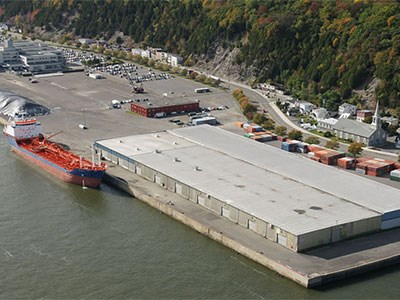Budding wood pellet producer Rentech Inc. is counting on a new Quebec City marine terminal to be an important logistical cornerstone of its Wawa operation.
By way of a 15-year contract with Quebec Stevedoring, the Los Angeles-based company intends to move pellets through a dedicated storage and vessel loading facility situated at the port. The terminal boasts 80,000 tonnes of capacity for wood pellets.
Speaking at the CanBio Conference in Thunder Bay in early September, Steve Robert, Rentech’s managing director in Canada, emphasized shipping is a vital component of the emerging biomass industry.
“(This) is the only dedicated port terminal in Eastern Canada that can really move pellets in really any significant proportion, and it’s a $25-million project in itself.”
Roberts said even though the new terminal comes with a hefty price tag, in the long run it will help keep costs under control.
“(To get) the economies of scale that are required for an industrial pellet, you have to have dedicated ship loading.”
The pellets moving through the terminal will originate at Rentech’s plant near Wawa, a converted Weyerhaeuser OSB (oriented strandboard) mill. It’s currently under construction and slated to be operational by the end of the year.
The Wawa plant will focus on fulfilling a 10-year contract to supply 400,000 tonnes of pellets annually to Drax Group, a United Kingdom-based electricity producer. Roberts said Drax’s willingness to sign on the dotted line really helped things move forward.
“We have worked very hard (with Drax) to come up with long-term off-take agreements that are fairly unique in this space, that have been able to be the backstop of bank financing and building these projects.”
As for getting the pellets to port, a journey of more than 1,500 kilometres, Rentech has an agreement with CN Rail.
When faced with the complexities of taking their product to an international market, Roberts said Rentech decided to bring in outside expertise: Singapore- based CWT Commodities, a company specializing in supply chain management.
“The level of sophistication required to get into these supply chains and manage these supply chains, to manage your rail cars, to manage when the lake window ends (St. Lawrence Seaway winter freeze-up) and when your boats arrive at port is a whole industry unto itself.”
The challenge of shipping internationally stands in stark contrast to Rentech’s smaller Northern Ontario project in Atikokan, a converted particle board mill that will produce wood pellets for Ontario Power Generation (OPG).
Rentech originally aimed to start production by summer’s end, but pushed back the Atikokan launch date to October as some equipment had yet to be delivered.
That facility’s fuel is destined for OPG’s Atikokan Generating Station, the town’s former coal-burner that underwent a $170-million conversion to roast biomass instead.
Like Rentech’s deal with Drax, the company has a 10-year supply contract with OPG to provide fuel. However, the amount is only 45,000 tonnes a year, just under half of the Atikokan plant’s potential 100,000-tonne output.
Resolute Forest Products is the other pellet supplier.
According to Roberts, the two long-term contracts are especially important to Rentech as it hopes to eventually take its wood processing business public through an IPO in the next couple of years.
As for bringing the Atikokan and Wawa plants online almost simultaneously, he said it’s been a tremendous amount of effort.
“I really have to hand it to everybody that’s been involved. Everybody is going full tilt on our projects right now. Really, if I was going to summarize my experience of the past 15 to 16 months of putting these projects together, whatever you think it’s going to take, multiply by two or three. There is no question there is an insane amount of work that goes into doing these.”
Roberts declined to do an interview with Northern Ontario Business following his presentation.




